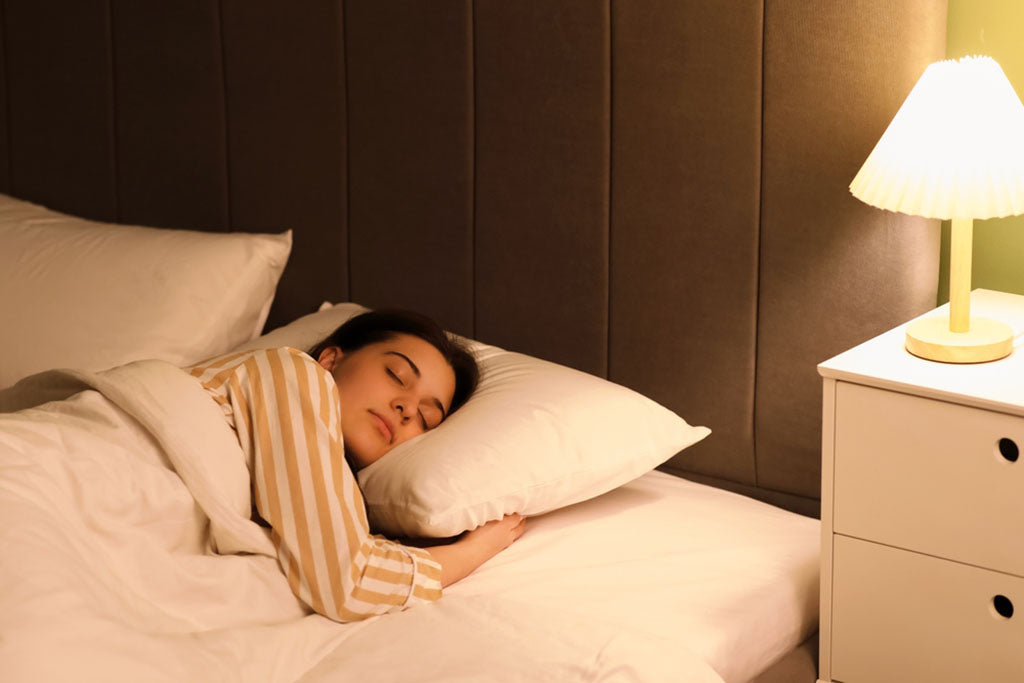Source: Pixel-Shot/Shutterstock.com
We’ve all been there—tossing and turning, staring at the ceiling, and wondering why we can’t fall asleep. Whether you’re dealing with stress, a busy schedule, or just feeling out of sorts, getting a good night’s sleep can be challenging. But it doesn’t have to be!
There are plenty of simple, practical ways to improve your sleep, and it’s not about overhauling your whole routine. The little yet powerful adjustments below can go a long way in helping you finally catch those elusive Z’s.
Browse Our Vitamins to Help You SleepTop Ways to Help with Sleep
If you’ve been asking, “What are ways to help with sleep?” here are four simple yet effective things to help you sleep better and get the rest you need.
1. Create a Consistent Sleep Routine
Our bodies love routine, and one of the best things you can do for your sleep is to set a regular bedtime and wake-up time—yes, even on weekends. This helps your internal clock stay in sync, making it easier to fall asleep and wake up naturally.
Try creating a calming pre-bedtime routine, whether it's reading, listening to soft music, or practicing relaxation techniques like deep breathing. Over time, your body will start to associate that routine with sleep, making it easier to drift off.
2. Use Natural Vitamins & Supplements that Promote Sleep
Sometimes, stress is the biggest barrier to a good night’s sleep, and that’s where natural vitamins and supplements can make a difference. Options like magnesium and melatonin can help calm your mind and body, helping you to relax and fall asleep.
Additionally, studies have shown that L-theanine could help people relax before bedtime, sleep more easily, and sleep more deeply. Country Life Vitamins’ Stress Shield® Nighttime is formulated with 150mg L-theanine to support relaxation, in addition to other science-backed ingredients.
Talk to a healthcare provider to find out which supplement might work best for you.
Unlock a Discount on Your Next Order Here3. Limit Screen Time Before Bed
Did you know that seemingly harmless late-night scrolling through your phone is one of the biggest culprits behind restless sleep? The blue light emitted from screens can mess with your body’s production of melatonin, a hormone that helps regulate sleep.
Try powering down your devices at least 30 minutes before bed (though 2 hours is ideal!) and choose a calming activity instead, like reading or stretching. If you have to use a screen, consider using a blue light filter to minimize the impact on your sleep.
4. Optimize Your Sleep Environment
Your bedroom should be conducive to sleep. Keep the room cool, dark, and quiet to create the perfect environment for rest. Invest in comfortable bedding and try a white noise machine or earplugs if noise is an issue.
Whether it’s setting a consistent routine, creating a calming sleep environment, limiting screentime before bed, or adding natural stress relief supplements and vitamins to help you sleep into your wind-down routine, these simple steps can help you relax, enjoy more restful sleep, and wake up feeling refreshed.
Source:
https://www.sutterhealth.org/health/sleep/screens-and-your-sleep-the-impact-of-nighttime-use












Share:
Which Vitamins are Considered Antioxidants?
How Can I Have a Healthy Heart? 5 Ways to Strengthen Heart Health